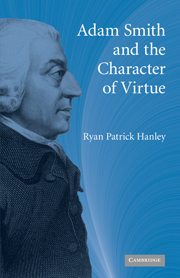Book contents
- Frontmatter
- Contents
- Preface
- Acknowledgments
- Abbreviations
- Introduction
- 1 The Problem: Commerce and Corruption
- 2 The Solution: Moral Philosophy
- 3 Interlude: The What and the How of TMS VI
- 4 Prudence, or Commercial Virtue
- 5 Magnanimity, or Classical Virtue
- 6 Beneficence, or Christian Virtue
- Epilogue: The “Economy of Greatness”
- Index
- References
5 - Magnanimity, or Classical Virtue
Published online by Cambridge University Press: 06 November 2009
- Frontmatter
- Contents
- Preface
- Acknowledgments
- Abbreviations
- Introduction
- 1 The Problem: Commerce and Corruption
- 2 The Solution: Moral Philosophy
- 3 Interlude: The What and the How of TMS VI
- 4 Prudence, or Commercial Virtue
- 5 Magnanimity, or Classical Virtue
- 6 Beneficence, or Christian Virtue
- Epilogue: The “Economy of Greatness”
- Index
- References
Summary
THE PROBLEMS OF PRUDENCE AND THE THERAPY OF MAGNANIMITY
Let us restate the problem to this point. Commerce seems to depend on vanity, yet vanity induces restlessness, anxiety, duplicity, and inauthenticity. Prudence offers a palliative remedy that ameliorates these vices by redirecting, and thus mitigating, the love of esteem inseparable from commerce. Yet such a remedy engenders new ills of its own – particularly individualism and mediocrity, the consequences of prudence's reanimation of the love of acquisition – and hence Smith's dialectical approach to the study of prudence, and indeed to the study of ethical virtue more generally. Smith's balanced account of prudence testifies to his recognition that positing a practical solution to a moral or political problem often induces new problems which in turn require redress. In the case at hand, the reification of self-love encouraged by prudence intensifies the natural propensity to self-preference that it was in fact intended to ameliorate. As a consequence, Smith must now confront a new set of challenges – challenges that are both original to the corruption induced by commercial society and exacerbated by prudence. Chief among these are the ills of self-preference, or individualism, and mediocrity, or an indifference to excellence and nobility. Remedying these two ills is the task of his account of magnanimity.
Stating the problem in these terms is likely to prompt at least two objections, one skeptical of this description of the problem, another skeptical of the solution.
- Type
- Chapter
- Information
- Adam Smith and the Character of Virtue , pp. 132 - 174Publisher: Cambridge University PressPrint publication year: 2009



